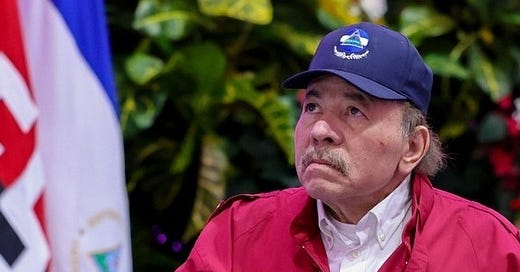"Daniel Ortega Diciembre 2024" by Consejo de Comunicación y Ciudadanía del Gobierno de Nicaragua (Public Domain CC0 1.0).
Editor's Note: Mr. Fernandez's thesis won the FAO Association writing award at the U.S. Army War College in 2023, reflecting conditions and policy at that time.
The Journal is pleased to bring you this outstanding scholarship. Because of spacing constraints, we publish this version without research notes. To see the full thesis, please contact FAOA
An analysis of U.S. policy towards Nicaragua provides insight into the correct strategic posture for engaging entrenched authoritarian leaders more broadly. This paper contends that U.S. policy towards Nicaragua is counterproductive and should be revised. It begins with a discussion of the Nicaraguan operational environment through the frameworks of Historical Mindedness and Strategic Empathy, positing that the image of the United States as an imperialist interloper in the Nicaraguan conscience colors the bilateral relationship and impedes constructive engagement. It argues that the primary goal of current U.S. policy is to bring about regime change and transform Nicaragua into a democracy through sanctions, concluding that the policy is destined to fail as sanctions generally do not work with dictators and, with or without sanctions, dictators rarely relinquish their positions willingly. The paper highlights key considerations for U.S. policymakers, including Ortega's popular support, the improbability of Ortega succumbing to U.S. pressure, and the necessity for a net assessment of the costs of current U.S. policy and whether it risks driving Nicaragua towards U.S. extra-hemispheric competitors. The paper concludes with recommendations for a better-informed U.S. policy based on realistic goals that serve U.S. interests rather than idealistic aspirations.
Introduction
In 1990, Violeta Chamorro won Nicaragua's presidential elections, putting an end to 21 years of rule by the revolutionary Sandinista movement that had seized power in the country in 1979. In 2002, as part of its implementation of U.S. policy to fight international corruption, the U.S. Embassy in Managua provided guidance and assistance to the liberal government of President Enrique Bolaños that put former President Arnoldo Aleman and several of his ministers behind bars for stealing millions of dollars from government coffers. U.S. collaboration unwittingly destabilized the government, thereby laying the groundwork for the Sandinistas’ eventual return to power.
Scarcely three years later, Daniel Ortega, who had been voted out of office in 1990, was elected president once again on promises that he had reformed his Marxist views and would pursue free-market reforms. However, almost immediately, Ortega turned his back on democracy and began the process of transforming Nicaragua into a one-party dictatorship – one that continues to court Russia and has signed a contract with the PRC for a Chinese-controlled inter-oceanic canal that has strategic Great Power ramifications for Latin America. As a result, the United States now finds itself facing an intractable regional opponent who continually presents difficult diplomatic and informational problems and whose negative impact in Latin America is exacerbated by its engagement with U.S. extra-hemispheric rivals, Russia and the People’s Republic of China (PRC). The U.S. collaboration with former President Enrique Bolaños that ultimately brought down the liberal government illustrates one of many ways in which U.S. policy toward Nicaragua has been counterproductive and will serve to drive Nicaragua further into the U.S. competitors’ camps. The United States must engage Nicaragua on a primarily transactional basis as part of the U.S. strategy to win the Great Power competition.
But how did a liberal Nicaraguan administration that from 1990 to 2006 had created unprecedented economic growth and prosperity last only 16 years? How did a country that had successfully lured back thousands of U.S.-based Nicaraguan entrepreneurs who had fled the Sandinistas in 1990 fail to win the 2006 election, putting it on a path to pariah status? How did U.S. policy alienate the Nicaraguan government to such degree that they perceived their only option was to affiliate with U.S. competitors – Russia and the PRC? An examination of U.S. policy through the lens of “historical mindedness” and “strategic empathy” yields compelling insight. “Historical mindedness” refers to the idea that the history of a country shapes its current status and thus it is important to understand that history to successfully engage with that country; strategic empathy refers to the idea that to understand an individual’s motives and potential future actions policymakers must put themselves in that individual’s situation and attempt to reason accordingly.



